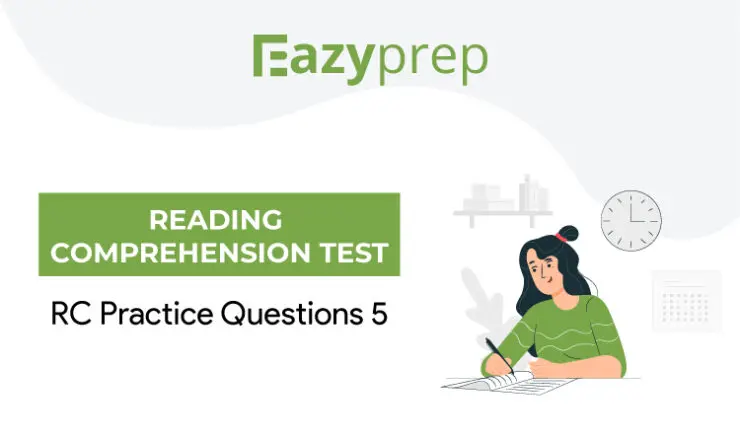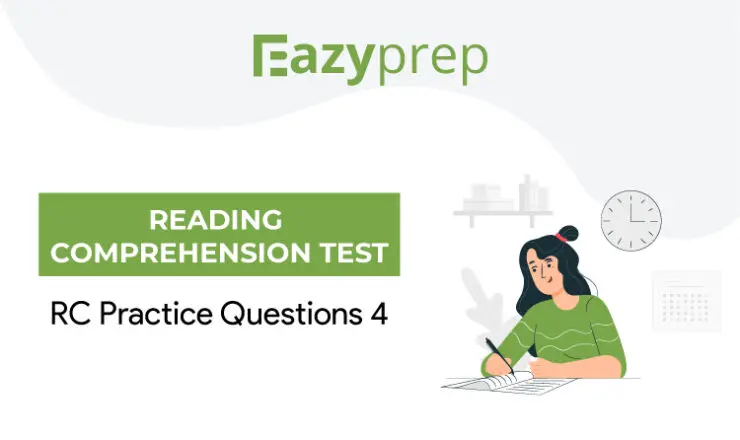Welcome to Reading Comprehension Test | RC Practice Questions 1
The following quiz will have 5-10 MCQs. The questions are framed to test your General Knowledge.
This quiz is intended to provide you a quick and thorough revision of General Knowledge. If you score less, please do not lose calm. Read the answers and the explanations provided to remember better. If you would like to ask anything or give us any feedback, leave a comment below and we will respond.
Hope you enjoy this quiz. If you like it, then please share it. Thank you.
1.
Gandhiji never believed in ________. Read the passage below and find the answer.
Gandhiji recognized that, while all men should have equal opportunity, all did not have the same capacity. Some had the ability to earn more than others. But, he believed that those who had talent would be performing the work of society if they used their talent wisely and well. Gandhiji said that he would allow a man of intellect to earn more and not suppress his talent. But it was his view that the bulk of his larger earnings should go to the common fund. Those with talent and opportunity would find their fulfillment as trustees. Gandhiji extended this concept of trusteeship to cover all fields of life.
2.
What should be the title of the following passage?
Gandhiji recognized that, while all men should have equal opportunity, all did not have the same capacity. Some had the ability to earn more than others. But, he believed that those who had talent would be performing the work of society if they used their talent wisely and well. Gandhiji said that he would allow a man of intellect to earn more and not suppress his talent. But it was his view that the bulk of his larger earnings should go to the common fund. Those with talent and opportunity would find their fulfillment as trustees. Gandhiji extended this concept of trusteeship to cover all fields of life.
3.
What is the meaning of the word “trustee" in the following passage?
Gandhiji recognized that, while all men should have equal opportunity, all did not have the same capacity. Some had the ability to earn more than others. But, he believed that those who had talent would be performing the work of society if they used their talent wisely and well. Gandhiji said that he would allow a man of intellect to earn more and not suppress his talent. But it was his view that the bulk of his larger earnings should go to the common fund. Those with talent and opportunity would find their fulfillment as trustees. Gandhiji extended this concept of trusteeship to cover all fields of life.
4.
What was Cissy's reaction when she saw the biscuit cartons? Read the following passage and find out.
Through the break between the trees, she looked into one of the lighted windows above the shop. She could see the cartons of biscuits neatly piled near the far wall. Against her conscious wishes, Cissy's salivary glands started pumping fluid into her mouth. She felt her heart beating strongly, from ks the top of her throat into the back of her mouth. "There is nd nobody", she thought. "I can dash in and take a box and dash out again. I know it is a sin but the Lord will not punish us if we are so hungry."
5.
What does the following passage describe?
Through the break between the trees, she looked into one of the lighted windows above the shop. She could see the cartons of biscuits neatly piled near the far wall. Against her conscious wishes, Cissy's salivary glands started pumping fluid into her mouth. She felt her heart beating strongly, from ks the top of her throat into the back of her mouth. "There is nd nobody", she thought. "I can dash in and take a box and dash out again. I know it is a sin but the Lord will not punish us if we are so hungry."
6.
How was Cissy able to see the cartons of biscuits? Read the following passage and answer.
Through the break between the trees, she looked into one of the lighted windows above the shop. She could see the cartons of biscuits neatly piled near the far wall. Against her conscious wishes, Cissy's salivary glands started pumping fluid into her mouth. She felt her heart beating strongly, from ks the top of her throat into the back of her mouth. "There is nd nobody", she thought. "I can dash in and take a box and dash out again. I know it is a sin but the Lord will not punish us if we are so hungry."
7.
In Haiti, what do people believe? Read the following passage and answer.
Until very recently, it was universally believed that men are congenitally more intelligent than women; even so enlightened a man as Spinoza decided against voting for women on this ground. Among white men, it is held that white men are by nature superior to black men; in Japan, on the contrary, it is thought that yellow is the best color. In Haiti, when they make statues of Christ and Satan, they make Christ black and Satan white. Aristotle and Plato considered Greeks so innately superior to barbarians that slavery was justified as long as the master was Greek and the slave a barbarian.
8.
Aristotle and Plato supported slavery because they thought ________. Read the following passage and answer.
Until very recently, it was universally believed that men are congenitally more intelligent than women; even so enlightened a man as Spinoza decided against voting for women on this ground. Among white men, it is held that white men are by nature superior to black men; in Japan, on the contrary, it is thought that yellow is the best color. In Haiti, when they make statues of Christ and Satan, they make Christ black and Satan white. Aristotle and Plato considered Greeks so innately superior to barbarians that slavery was justified as long as the master was Greek and the slave a barbarian.
9.
Spinoza decided against votes for women because according to him ________. Read the passage and answer.
Until very recently, it was universally believed that men are congenitally more intelligent than women; even so enlightened a man as Spinoza decided against voting for women on this ground. Among white men, it is held that white men are by nature superior to black men; in Japan, on the contrary, it is thought that yellow is the best color. In Haiti, when they make statues of Christ and Satan, they make Christ black and Satan white. Aristotle and Plato considered Greeks so innately superior to barbarians that slavery was justified as long as the master was Greek and the slave a barbarian.
10.
What was the main cause of poor health conditions of women in India? Read the passage and answer.
At one time in the history of India, most women knew very well how to bring up their infants and they lived a perfectly healthy life, free from diseases. The overall standard of women and children in the country was much better than that of other civilizations of that period. But ever since India was exposed to frequent foreign invasions from foreign nations, life was unsafe and property unprotected, the people were forced to congregate in towns in such a compact way that it led to awful insanitation and diseases. The traditional knowledge of domestic and personal health and hygiene was ignored. Women were confined indoors for fear of insults and a train of social and unhealthy dangers followed all around. It is a problem how now we can restore the original conditions of a healthy and happy life in India. This is a socio-economic problem that needs to be given priority to bring back the original culture and restore the welfare of women and children in India.
11.
What question has the writer posed before the readers in the following passage?
At one time in the history of India, most women knew very well how to bring up their infants and they lived a perfectly healthy life, free from diseases. The overall standard of women and children in the country was much better than that of other civilizations of that period. But ever since India was exposed to frequent foreign invasions from foreign nations, life was unsafe and property unprotected, the people were forced to congregate in towns in such a compact way that it led to awful insanitation and diseases. The traditional knowledge of domestic and personal health and hygiene was ignored. Women were confined indoors for fear of insults and a train of social and unhealthy dangers followed all around. It is a problem how now we can restore the original conditions of a healthy and happy life in India. This is a socio-economic problem that needs to be given priority to bring back the original culture and restore the welfare of women and children in India.
12.
Why did life become unsafe and property unprotected? Read the following passage and answer.
At one time in the history of India, most women knew very well how to bring up their infants and they lived a perfectly healthy life, free from diseases. The overall standard of women and children in the country was much better than that of other civilizations of that period. But ever since India was exposed to frequent foreign invasions from foreign nations, life was unsafe and property unprotected, the people were forced to congregate in towns in such a compact way that it led to awful insanitation and diseases. The traditional knowledge of domestic and personal health and hygiene was ignored. Women were confined indoors for fear of insults and a train of social and unhealthy dangers followed all around. It is a problem how now we can restore the original conditions of a healthy and happy life in India. This is a socio-economic problem that needs to be given priority to bring back the original culture and restore the welfare of women and children in India.
13.
What does the art of writing do to man's character? Read the passage and answer.
Read not to contradict and confute, nor to believe and take for granted, nor to find talk and discourse, but to weigh and consider. Some books are to be tasted, others to be swallowed, and some few to be chewed and digested; that is, some books are to be read-only in parts; others to be read, but not curiously, and some few to be read wholly and with diligence and attention. Some books may also be read by deputy and extracts made of them by others; but that would be only in the less important arguments and the meaner sort of books; else distilled books are like common distilled waters, flashy things. Reading maketh a full man, conference a ready man, and writing an exact man. And, therefore, if a man writes little, he had need have a good memory; if he confers little, he had need have a present wit; and if he read little, he had need have much cunning to seem to know that he doth not. “Histories make men wise, poets witty, the mathematics subtle, natural philosophy deep, moral, logic and rhetoric able to contend.”
14.
The word ‘confute' in the following passage means _________.
Read not to contradict and confute, nor to believe and take for granted, nor to find talk and discourse, but to weigh and consider. Some books are to be tasted, others to be swallowed, and some few to be chewed and digested; that is, some books are to be read-only in parts; others to be read, but not curiously, and some few to be read wholly and with diligence and attention. Some books may also be read by deputy and extracts made of them by others; but that would be only in the less important arguments and the meaner sort of books; else distilled books are like common distilled waters, flashy things. Reading maketh a full man, conference a ready man, and writing an exact man. And, therefore, if a man writes little, he had need have a good memory; if he confers little, he had need have a present wit; and if he read little, he had need have much cunning to seem to know that he doth not. “Histories make men wise, poets witty, the mathematics subtle, natural philosophy deep, moral, logic and rhetoric able to contend.”
15.
Which of the following words suitably replace the word ‘confer' used in the following passage?
Read not to contradict and confute, nor to believe and take for granted, nor to find talk and discourse, but to weigh and consider. Some books are to be tasted, others to be swallowed, and some few to be chewed and digested; that is, some books are to be read-only in parts; others to be read, but not curiously, and some few to be read wholly and with diligence and attention. Some books may also be read by deputy and extracts made of them by others; but that would be only in the less important arguments and the meaner sort of books; else distilled books are like common distilled waters, flashy things. Reading maketh a full man, conference a ready man, and writing an exact man. And, therefore, if a man writes little, he had need have a good memory; if he confers little, he had need have a present wit; and if he read little, he had need have much cunning to seem to know that he doth not. “Histories make men wise, poets witty, the mathematics subtle, natural philosophy deep, moral, logic and rhetoric able to contend.”
![]()



